wp4
ESTYLF conference organized
The FLAIR group organises ESTYLF (the Spanish Conference on Fuzzy Logic and Technology) as an event of CAEPIA (Spanish conference on Artificial Intelligence), within the Spanish Conference of Informatics (CEDI) in Málaga
The new edition of the Spanish Conference on Fuzzy Logic and Technology (ESTYLF) has been organised by our group, being Manuel Ojeda-Aciego the Scientific Chair (together with Susana Montes from Univ. Oviedo).
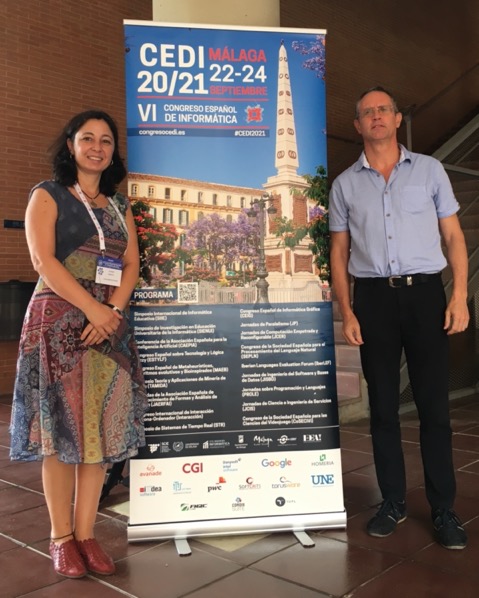
We also participate as co-editors of the proceedings of CAEPIA'21, published by Springer.
Conference papers accepted
12/07/21/11:10 Filed in: Conference papers
O. Krídlo, M. Ojeda-Aciego. Sugeno integral for Atanassov intuitionistic fuzzy sets. Eur. Symp. on Computational Intelligence and Mathematics, Budapest, 2021.
ABSTRACT We work on the recently proposed relationship between L-fuzzy measures and integrals and isotone concept-forming operators on a Girard monoid in order to define a generalized notion of Sugeno integral for Atanassov Intuitionistic L-fuzzy sets. We also provide some examples on the practical interpretation of the new proposed notion.
M. Ojeda-Aciego, J.M. Rodriguez-Jimenez. Advances in forgery detection of driving licences using truthfulness degrees. Eur. Symp. on Computational Intelligence and Mathematics, Budapest, 2021.
ABSTRACT We develop a methodology which allows to detect forgeries in driving licences based on an analysis of two serial codes usually present in licences issued in European countries. Results from the initial analysis of licences issued in France and Italy are presented.
ABSTRACT We work on the recently proposed relationship between L-fuzzy measures and integrals and isotone concept-forming operators on a Girard monoid in order to define a generalized notion of Sugeno integral for Atanassov Intuitionistic L-fuzzy sets. We also provide some examples on the practical interpretation of the new proposed notion.
M. Ojeda-Aciego, J.M. Rodriguez-Jimenez. Advances in forgery detection of driving licences using truthfulness degrees. Eur. Symp. on Computational Intelligence and Mathematics, Budapest, 2021.
ABSTRACT We develop a methodology which allows to detect forgeries in driving licences based on an analysis of two serial codes usually present in licences issued in European countries. Results from the initial analysis of licences issued in France and Italy are presented.
Journal paper accepted
03/07/20/10:58 Filed in: Journal paper
J.M. Rodríguez, M. Ojeda-Aciego. Formal concept analysis with negative attributes for forgery detection. Computational and Mathematical Methods, 2020.
ABSTRACT Europe’s system of open frontiers, commonly known as "Schengen", let people from different countries travel and cross the inner frontiers without problems. Different documents from these countries, not only European, can be found in road checkpoints and there is no international database to help Police forces to detect whether they are false or not. People who need a driver license to access to specific jobs, or a new identity because of legal problems, often contact forgers who provide false documents with different levels of authenticity. Governments and Police Forces should improve their methodologies, by ensuring that staff is increasingly better able to detect false or falsified documents through their examination, and follow patterns to detect and situate these forgers. In this work we propose a method, based in Formal Concept Analysis using negative attributes, that allows Police forces analysing false documents and provides a guide to enforce the detection of forgers.
ABSTRACT Europe’s system of open frontiers, commonly known as "Schengen", let people from different countries travel and cross the inner frontiers without problems. Different documents from these countries, not only European, can be found in road checkpoints and there is no international database to help Police forces to detect whether they are false or not. People who need a driver license to access to specific jobs, or a new identity because of legal problems, often contact forgers who provide false documents with different levels of authenticity. Governments and Police Forces should improve their methodologies, by ensuring that staff is increasingly better able to detect false or falsified documents through their examination, and follow patterns to detect and situate these forgers. In this work we propose a method, based in Formal Concept Analysis using negative attributes, that allows Police forces analysing false documents and provides a guide to enforce the detection of forgers.
CMMSE'19
06/07/19/09:19 Filed in: Conference participation | Chairing
Intl Conf on Computational and Mathematical methods in Science and Engineering. Rota, July 1-5, 2019
Three members of the group attended CMMSE this year, where we organised a special session on "Mathematical Models for Computer Science".

Domingo López (left) presented Recommendations in CDSS using Fuzzy Formal Concept Analysis, and Nicolás Madrid (right) presented Towards a measure of inclusion from the index of inclusion between fuzzy sets.
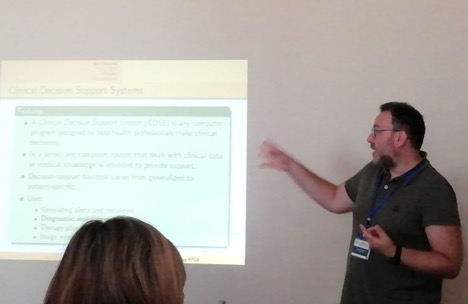
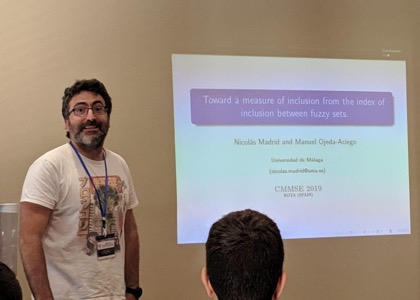
Last but not least, J.M. Rodríguez (left) presented Analysing patterns in false documents with Formal Concept Analysis to detect forgers, and Manuel Ojeda (right) presented Relational Galois connections between fuzzy t-digraphs.
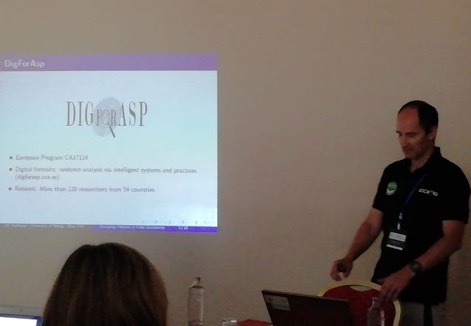
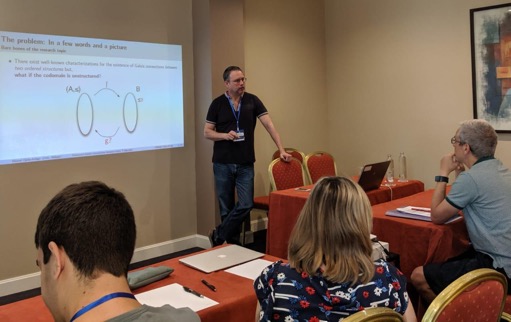
Conference papers accepted
15/05/19/09:03 Filed in: Conference papers
J.M. Rodriguez-Jimenez and M. Ojeda-Aciego. Analysing patterns in false documents with Formal Concept Analysis to detect forgers. Intl Conference Computational and Mathematical Methods in Science and Engineering (CMMSE), Rota, 2019.
ABSTRACT Europe's system of open frontiers, commonly known as "Schengen", let people from different countries travel without problems crossing these frontiers. Different documents from these countries, not only European, could be found in road checkpoints, and Police forces have the problem that do not have an international database to know whether they are false or not. Some immigrants with legal problems in their original countries who need a new identity, or want a driver license to access to specific jobs, contact forgers who provide false documents with different levels of authenticity. Countries and Police Forces should improve their methodologies, by ensuring that staff is increasingly better able to detect false of falsified documents through their examination, and follow patterns to detect and ubícate these forgers. In this paper, we propose a method based on Formal Concept Analysis with negative attributes that allows Police forces analysing false documents, and provides a guide to enforce the detection of forgers.
I.P. Cabrera, P. Cordero, E. Muñoz-Velasco and M. Ojeda-Aciego. Relational Galois connections between fuzzy t-digraphs. Intl Conference Computational and Mathematical Methods in Science and Engineering (CMMSE), Rota, 2019.
ABSTRACT The notion of relational Galois connection is extended to be applied between fuzzy transitive directed graphs. In this framework, the components of the connection are crisp relations satisfying certain reasonable properties given in terms of the so-called full powering.
N. Madrid and M. Ojeda-Aciego. Towards a measure of inclusion from the index of inclusion between fuzzy sets. Intl Conference Computational and Mathematical Methods in Science and Engineering (CMMSE), Rota, 2019.
ABSTRACT Despite of the notion of inclusion between fuzzy sets has taken a great interest of a large number of researchers since Zadeh presented his seminal work in 1965, there is not a consensus about how to extend such a notion in fuzzy set theory yet. In this contribution we recall a recent fresh approach that represent the inclusion between two fuzzy sets by mean of a mapping (called index of inclusion) instead of a degree, as the standard approaches do. Moreover, we present a measure of inclusion (i.e. a degree) defined from our index of inclusion that allows to compare our approach directly with others in the literature.
D. López, A. Mora. Recommendations in CDSS using Fuzzy Formal Concept Analysis. Intl Conference Computational and Mathematical Methods in Science and Engineering (CMMSE), Rota, 2019.
ABSTRACT One of the hot topics in clinical research is hidden knowledge discovery in datasets with a high number of features (variables or attributes). We approach how to provide recommendations in Clinical Decision Support Systems (CDSS) to guide the experts in the diagnostic process. We work by mining graded implications from the dataset using the NEXTCLOSURE algorithm for Graded Attributes. Reasoning with these graded implications is done with the so-called Fuzzy Attribute Simplification Logic. As the number of graded implications mined from the fuzzy formal context is huge and with a high degree of redundancy, the objective is to obtain a equivalent set without redundancy, by applying the rules of the logic..
ABSTRACT Europe's system of open frontiers, commonly known as "Schengen", let people from different countries travel without problems crossing these frontiers. Different documents from these countries, not only European, could be found in road checkpoints, and Police forces have the problem that do not have an international database to know whether they are false or not. Some immigrants with legal problems in their original countries who need a new identity, or want a driver license to access to specific jobs, contact forgers who provide false documents with different levels of authenticity. Countries and Police Forces should improve their methodologies, by ensuring that staff is increasingly better able to detect false of falsified documents through their examination, and follow patterns to detect and ubícate these forgers. In this paper, we propose a method based on Formal Concept Analysis with negative attributes that allows Police forces analysing false documents, and provides a guide to enforce the detection of forgers.
I.P. Cabrera, P. Cordero, E. Muñoz-Velasco and M. Ojeda-Aciego. Relational Galois connections between fuzzy t-digraphs. Intl Conference Computational and Mathematical Methods in Science and Engineering (CMMSE), Rota, 2019.
ABSTRACT The notion of relational Galois connection is extended to be applied between fuzzy transitive directed graphs. In this framework, the components of the connection are crisp relations satisfying certain reasonable properties given in terms of the so-called full powering.
N. Madrid and M. Ojeda-Aciego. Towards a measure of inclusion from the index of inclusion between fuzzy sets. Intl Conference Computational and Mathematical Methods in Science and Engineering (CMMSE), Rota, 2019.
ABSTRACT Despite of the notion of inclusion between fuzzy sets has taken a great interest of a large number of researchers since Zadeh presented his seminal work in 1965, there is not a consensus about how to extend such a notion in fuzzy set theory yet. In this contribution we recall a recent fresh approach that represent the inclusion between two fuzzy sets by mean of a mapping (called index of inclusion) instead of a degree, as the standard approaches do. Moreover, we present a measure of inclusion (i.e. a degree) defined from our index of inclusion that allows to compare our approach directly with others in the literature.
D. López, A. Mora. Recommendations in CDSS using Fuzzy Formal Concept Analysis. Intl Conference Computational and Mathematical Methods in Science and Engineering (CMMSE), Rota, 2019.
ABSTRACT One of the hot topics in clinical research is hidden knowledge discovery in datasets with a high number of features (variables or attributes). We approach how to provide recommendations in Clinical Decision Support Systems (CDSS) to guide the experts in the diagnostic process. We work by mining graded implications from the dataset using the NEXTCLOSURE algorithm for Graded Attributes. Reasoning with these graded implications is done with the so-called Fuzzy Attribute Simplification Logic. As the number of graded implications mined from the fuzzy formal context is huge and with a high degree of redundancy, the objective is to obtain a equivalent set without redundancy, by applying the rules of the logic..
